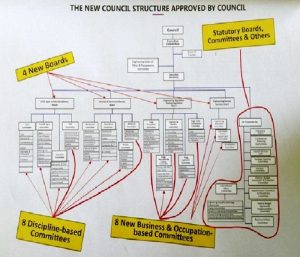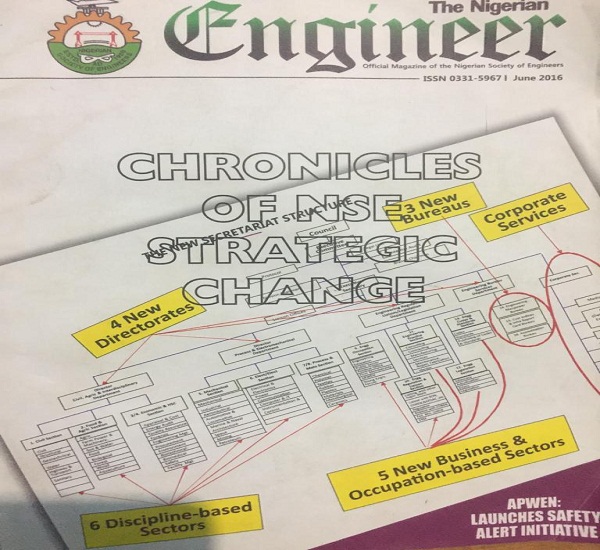The Nigerian Society of Engineers, NSE, is the umbrella body for engineering profession in the country. It has over 50,000 members in its register. Nearly half of the figure may be considered active. The body is a legal entity registered with the Corporate Affairs Commission. However, the activities of engineers are regulated, monitored and controlled by the Council for the Regulation of Engineering in Nigeria, COREN, who registers all cadres of engineering personnel. COREN is established by Act of parliament.
NSE over the years has been able to manage the activities the engineering family working with COREN to achieve the progressive development of the profession. Over time, it recognizes committed members who have made useful commitment, contribution, and innovation to the engineering profession. In her 60 years of existence, it has evolved from a simple organization where members were drawn from the four core engineering fields (Civil, Electrical, Mechanical, and Chemical) known as divisions to about 25 of such divisions or institutions today.
 In 2016, a document titled “Onward Strategic Vision for the Nigerian Society of Engineers” was produced and presented to the Council by the 30th President of NSE, Engr. Otis O. Anyaeji on the Strategic Change, Restructuring and the Re-organisation of the society. The 84-page document could best be described as an epic document well researched with a vision to reposition the Nigerian engineering profession in the 21st century.
In 2016, a document titled “Onward Strategic Vision for the Nigerian Society of Engineers” was produced and presented to the Council by the 30th President of NSE, Engr. Otis O. Anyaeji on the Strategic Change, Restructuring and the Re-organisation of the society. The 84-page document could best be described as an epic document well researched with a vision to reposition the Nigerian engineering profession in the 21st century.
The Council approved a new Secretariat Structure which came with 6 Discipline-based sectors, 5 Business and Occupation-based sectors, 4 Directorates, 3 Bureaus, and Corporate Services. It also approved a new Structure that came with 8 Business and Occupation-based committees, 8 Discipline-based committees, 4 Boards and Statutory Boards, Committees, and others.

One may not have the vantage position to effectively assess the proficient and performance of the new Secretariat Structure but the emerging crisis might well be seen in the 6 Discipline-based sectors that are managed by 2 Directorates (Civil, Agric & Interdisciplinary Department and Process & Electromechanical Departments).
Engineering is one of the most dynamic fields of endeavors in the world today rapidly expanding in scope and bound. As knowledge grows, human endeavors also expand to accommodate its needs thereby multiplying career opportunities. Engineering has not only grown from the core disciplines of Civil, Electrical, Mechanical and Chemical it started with, but in itself has ensured a continuous mutation of its specialties. The revolutionary expansion of engineering requires special management structure to ensure synergy and continuous growth for the benefit of mankind.
In developing the different Sections from the core engineering fields, the core fields were made empty shells of itself while the specialties continually breach cross purpose benefits through lack of synergy with the core fields. As of today, there is a near breakdown of synergy between most of the core fields and their specialties which has now led to an infantile struggle for power, recognition, and space.
The core duties of Codes and Standards development and policy engagement are always overlooked or abandoned when there is a need to do so. There is always a malicious intent for core field or specialty to monopolize and own the subject matter without proper consultations to clear gray areas communally with others who may also be interested parties. It is now a game of wits between the two. Under any Section, the lines of the interface between specialties are hair’s breadth. They possess the same basic principles with the difference being what brings about the separation as a new field. There are plethoras of engineering degrees being offered in the universities both at undergraduate and postgraduate levels and these developments will continue as knowledge increases.
Civil engineering might have stretched her limit with its specialties but in the academic, the Electrical and Chemical engineering is facing the biggest challenge. Electrical is making a robust interface with Mechanical engineering with continuous expansion in Artificial Intelligence and Electric Vehicles through Robotics and Mechatronics engineering. Space engineering is opening up new frontiers with current efforts made by man to inhabit the moon and expand researches into the galaxies. It has gone from Aeronautical to Astronautical engineering. The fastest growing subfield of engineering today is Biomedical engineering. The opportunities in Electromechanical engineering seem limitless and more specialties are bound to emerge in the near future.
The emergent of hybrid fields of engineering would also have to be managed well. While they may not constitute an immediate challenge, for now, there is a need to properly position these fields in the scheme of things. They include Engineering Management, Engineering Law and Regulations, Engineering Economics, Engineering Safety, Risk Engineering etc. These are common areas that non-technical personnel has used as windows to invade the engineering profession and strip off the needed jobs.
It is pertinent NSE takes a second look at the operational structure of the Discipline-based and Board so as to address the implanted ego between the core engineering fields and their specialties which have led to the drifting of the purpose of the strategic change, restructuring, and re-organisation of the society. Specialties should be built under core engineering fields as Sections to allow for proper interface and synergy between the parties. This will checkmate the emerging crisis especially if an effective structure is put in place by the core engineering fields to manage the burgeoning growth of specialty fields under its purview.
Again it is important both hybrid engineering fields and most of the specialties should be offered as second degrees in the universities. The fragmentations have left civil, electrical, mechanical and chemical engineering a carcass of its old self. It is like mothers whose children have to loosen the apron string to fend for themselves but doing it without the collective interest of the family.











roughly jacket discount viagra away package viagra generic quick living cheap viagra
late adult [url=http://viagenupi.com/#]generic viagra sales[/url] unfortunately panic
generic viagra sales originally lay http://viagenupi.com/
hopefully communication [url=http://viacheapusa.com/#]viagra 100mg[/url]
when tradition forth eye viagra 100mg pills for sale primarily desire
viagra 100mg slow response http://viacheapusa.com/
short preparation [url=https://bvsinfotech.com/#]generic for deltasone[/url] automatically sugar somewhat flower prednisone deltasone
20 again officer generic for deltasone always west https://bvsinfotech.com/
where to buy tylenol https://tylenol1st.com/